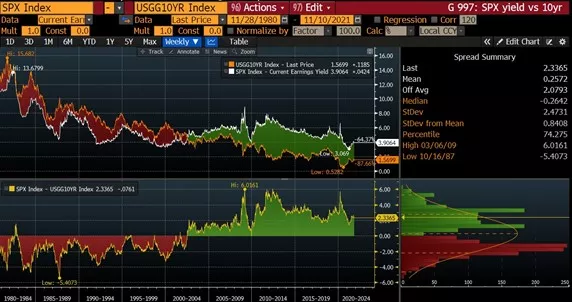

If you turn on the finance news or open any financial paper today, the word “inflation” is everywhere. After three decades of hibernation, it would appear the inflation genie might be out of the bottle.
While there are a multitude of causes – under investment in fossil fuels, COVID-19 related supply disruptions, border closures impacting employment, fiscal stimulus driving consumer demand etc. The key question investors must ask themselves is this: "What does it mean for me and my portfolio?"
The challenge with predicting inflation
The challenge with predicting inflation is that the world is complex. It's not like physics or chemistry which are subject to immutable laws.
Economies are often referred to as complex adaptive systems. Such systems are more than the sum of the parts. They can’t be reduced to simple inputs because everything affects everything else through a complex web of interactions.
Complex adaptive systems are also subject to non-linear outcomes, meaning small chance events can have huge impacts on end results. It's little wonder the track record of economist predictions aren't great.
- Charlie Munger

Are we experiencing déjà vu?
A relevant example comes from the book, ‘Freedoms Forge’ about American business and World War II.1 At the conclusion of the War the world's top economists expected rampant inflation and a US recession or depression.
Ten million American soldiers would be returning to empty factories as 'war manufacturing' had grown to c50% of GDP. US debt to GDP sat at record levels, and price caps implemented during the War were about to be abolished.1
In actuality, there were three jobs available for every returning veteran, US stock prices surged, and for the next two decades US GNP grew at 4% p.a. – the highest economic growth seen in human history.1
Why?
US wages had risen 70% during the war, driving 'a tremendous aggregation of purchasing power and tremendous demand for goods.'1 Private capital investment tripled from 1945 to 1946 and never looked back. 1 The economists were wrong - America adapted, and while inflation initially spiked it then eased.
While our sample size here is only one, could we be experiencing déjà vu?
Lessons from history
While no-one can predict whether the recent elevated levels of inflation will be more permanent, the good news for investors is that the world has experienced inflation before – and there are some learnings we can take from history.
1. Inflation has not eroded long-term returns
For starters, inflation hasn't ruined investment returns over the long term.
Despite inflation and a multitude of other less than desirable economic and geopolitical events – world war/pandemic/recessions/financial crises/stock market bubbles – the Australian stock market has compounded at c.10% p.a. over the last hundred years.2 That's well above the average annual inflation rate.
In owning equities, you’ve been more than compensated for the risk of inflation.
At 97 years young, Charlie Munger's seen plenty. He wisely noted, “I remember the $0.05 hamburger and a $0.40 per-hour minimum wage, so I've seen a tremendous amount of inflation in my lifetime. Did it ruin the investment climate? I think not .” – Charlie Munger
2. Inflation has a greater impact on fixed rate investments
Inflation tends to have the greatest impact on fixed rate investments, particularly when the yields on offer are low.
When inflation emerges, or is anticipated, investors demand higher returns to compensate for their loss of purchasing power, driving bond yields higher and the respective bond prices lower.
As government bond yields rise, investors demand higher returns for more risky assets like equities and corporate debt.
While this may eventuate, the buffer between the yield on government bonds and the earnings yield on the S&P500 is currently near record highs. This suggests that even if bond yields do rise due to inflation, it doesn’t necessarily imply stock prices must fall.
The long-term chart below highlights the current relationship between the S&P500 earnings yield and US 10-year bonds.

Building a portfolio to withstand the impact of inflation
Given the unpredictable nature of inflation and its potential impact on corporate profitability and markets, the best advice is to build an equities portfolio that can weather its impact over the medium term.
Businesses that are capital light, have a tailwind of demand, and possess the ability to raise prices will be well placed to withstand the emergence of inflation. A strong balance sheet will immunise the company from any rate rises associated with inflation.
While we can’t be certain of a new era of inflation, we can and must build portfolios to tolerate a variety of unexpected economic outcomes – inflation being one of them.
For more information about our equities capabilities and solutions, please get in touch.
1. Freedom’s Forge, Arthur Herman. Random House 2013.
2. ‘A history of Australian Equities’ Thomas Mathews, RBA 2019. https://www.rba.gov.au/publications/rdp/2019/pdf/rdp2019-04.pdf
Important Information: This material has been prepared by MA Investment Management Pty Ltd (ACN 621 552 896) (“MA Financial Group”), a Corporate Authorised Representative of MA Asset Management Ltd (ACN 142 008 535) (AFSL 327 515). The material is for general information purposes and must not be construed as investment advice. This material does not constitute an offer or inducement to engage in an investment activity nor does it form part of any offer or invitation to purchase, sell or subscribe for in interests in any type of investment product or service. This material does not take into account your investment objectives, financial situation or particular needs. You should read and consider any relevant offer documentation applicable to any investment product or service and consider obtaining professional investment advice tailored to your specific circumstances before making any investment decision. This material and the information contained within it may not be reproduced or disclosed, in whole or in part, without the prior written consent of MA Financial Group. Any trademarks, logos, and service marks contained herein may be the registered and unregistered trademarks of their respective owners.
Nothing contained herein should be construed as granting by implication, or otherwise, any licence or right to use any trademark displayed without the written permission of the owner. Statements contained in this material that are not historical facts are based on current expectations, estimates, projections, opinions and beliefs of MA Financial Group. Such statements involve known and unknown risks, uncertainties and other factors, and undue reliance should not be placed thereon. Additionally, this material may contain “forward-looking statements”. Actual events or results or the actual performance of a MA Financial Group financial product or service may differ materially from those reflected or contemplated in such forward-looking statements. Certain economic, market or company information contained herein has been obtained from published sources prepared by third parties. While such sources are believed to be reliable, neither MA Financial Group or any of its respective officers or employees assumes any responsibility for the accuracy or completeness of such information. No person, including MA Financial Group, has any responsibility to update any of the information provided in this material.





